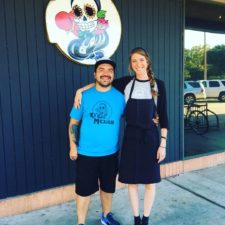Hard Work and Good Salsa Make for a Thriving Louisiana Business
Date: March 13, 2017
You won’t see any paid advertisements for Ki’ Mexico, a laid-back cantina that serves authentic Mexican food and margaritas in Shreveport, Louisiana. But the two-year-old restaurant has near-perfect ratings on Facebook, Yelp, and TripAdvisor, and regularly attracts crowds so large that co-owner Rodrigo Mondragon had to purchase a business next door to add a second dining room. “We’re one of the trendiest restaurants in town,” says Mondragon, “Even people from Texas, which is next door, and people from California say it’s the best Mexican restaurant they’ve ever been to. So we’re pretty proud of what we’re doing.”

Mondragon moved to the United States from Mexico City to study mass communications at Louisiana State University in Shreveport. When he graduated, however, the U.S. economy was mired in a recession and he was unable to find work in advertising. “I started thinking about the fact that I had a lot of experience in restaurants,” he says. “My mom is an excellent traditional Mexican cook, so I started thinking maybe that could be a business.”
Even people from Texas, which is next door, and people from California say it’s the best Mexican restaurant they’ve ever been to. So we’re pretty proud of what we’re doing.
Ki’ Mexico now generates $1.3 million in revenue and provides 26 people with jobs. In many ways, Mondragon’s story is typical of American immigrants, who started twice the number of new, small businesses in the United States in 2011 than U.S.-born citizens did and were instrumental in the nation’s recovery from the Great Recession. In Louisiana’s Fourth Congressional District, where Mondragon lives, immigrants are 38 percent more likely to be entrepreneurs.
Yet it is not always easy for immigrants, who may not have a lengthy credit history, to get a bank loan. Mondragon and his mother had begun by selling homemade salsa at the local farmer’s market in 2010. “We sold out in about an hour on our first day,” he recalls. “And then we kept selling out. Eventually that got boring.” They added food, cooking dishes like chorizo and egg breakfast burritos and steak tacos in front of customers, while continuing to hold full-time jobs in area restaurant kitchens.
It made for long hours, but they knew their authentic dishes were different than “what every other restaurant in town was offering,” says Mondragon. His mom even found the energy to “shout ‘tacos, tacos, tacos’ to get attention and help us sell more in the beginning.” They also added his younger brother, Eleazar, who had been studying at Le Cordon Bleu College of Culinary Arts in Austin and whose “shrimp tacos became a big hit,” says Mondragon. When a brewery asked them to set up a Friday night food stall and 30-minute lines regularly formed, they decided it was time to open their own restaurant.
But Mondragon’s family had trouble securing a loan. After several banks rejected their application, they saved enough money to finance the operation themselves. ”Building up our clientele, our name, our reputation — it was perfect because when we opened it was just like, ‘OK, come on, we’re ready for you,’ ” says Mondragon. Now word is spreading, prompting them to consider the possibility of opening a second location.
Mondragon, who became a citizen in 2015, says his family could not have found the same success in Mexico. “I’m very grateful to this country,” he says. “There are so many benefits to being here. People in this town are nice. It’s much safer than Mexico. And it is very easy to make a living here as long as you work hard.”
The problem with the current immigration system, he says, is that it throws up too many obstacles for hardworking immigrants. “It should be easier for those who are willing to work hard, not get in trouble, and be an honest person,” says Mondragon. “Of course criminals and drug dealers shouldn’t get those rights or a chance to apply for residency or citizenship. But immigrants who are going to follow the rules, work, pay taxes, and benefit this country should be rewarded for that.”
“Whatever you want to do, you can do it here,” says Mondragon. “I’ve succeeded in being a successful business person. And the United States gave me the chance to do it.”
